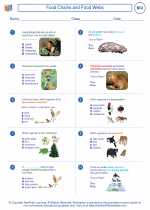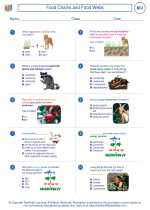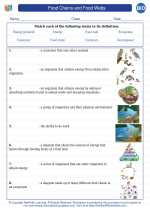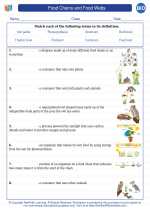Food Chains and Food Webs -> respiratory system
Respiratory System
The respiratory system is responsible for the exchange of gases between the body and the environment. It consists of the airways, the lungs, and the muscles of respiration. The primary function of the respiratory system is to supply the body with oxygen and dispose of carbon dioxide, a waste product of cellular respiration.
Anatomy of the Respiratory System
The respiratory system can be divided into the upper respiratory tract and the lower respiratory tract. The upper respiratory tract includes the nose, nasal cavity, pharynx, and larynx. The lower respiratory tract consists of the trachea, bronchi, bronchioles, and the lungs.
Function of the Respiratory System
The respiratory system performs several key functions, including:
- Gas Exchange: The exchange of oxygen and carbon dioxide between the air and the blood occurs in the alveoli of the lungs.
- Regulation of pH: By controlling the levels of carbon dioxide in the body, the respiratory system helps to maintain the acid-base balance.
- Sound Production: The larynx, also known as the voice box, is responsible for producing sound.
- Protection: The respiratory system helps to protect the body from inhaled pathogens and irritants.
Respiratory System Study Guide
When studying the respiratory system, it's important to focus on the following key concepts:
- Anatomy: Understand the structures of the upper and lower respiratory tracts, including their functions and interactions.
- Gas Exchange: Learn about the process of gas exchange in the alveoli, including the roles of oxygen and carbon dioxide.
- Respiratory Muscles: Familiarize yourself with the muscles involved in the process of breathing, such as the diaphragm and intercostal muscles.
- Respiratory Disorders: Explore common respiratory disorders such as asthma, chronic obstructive pulmonary disease (COPD), and pneumonia, including their causes, symptoms, and treatments.
- Respiratory Health: Understand the importance of maintaining respiratory health through factors such as proper nutrition, exercise, and avoidance of smoking and air pollution.
By mastering these concepts, you will gain a solid understanding of the respiratory system and its significance in maintaining overall health and well-being.
.◂Biology Worksheets and Study Guides High School. Food Chains and Food Webs

 Worksheet/Answer key
Worksheet/Answer key
 Worksheet/Answer key
Worksheet/Answer key
 Vocabulary/Answer key
Vocabulary/Answer key
 Vocabulary/Answer key
Vocabulary/Answer key
